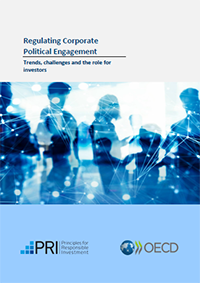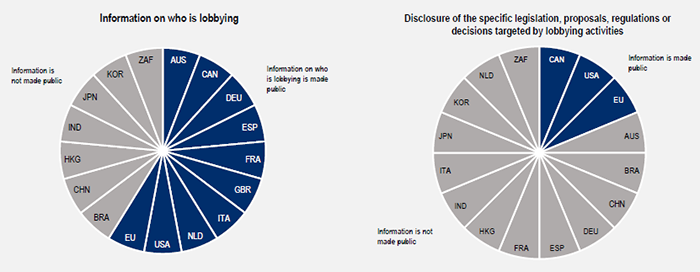Anti-corruption and integrity in the public sector
Regulating corporate political engagement: trends, challenges and the role for investors
Read the report here | Access the database hereWatch the replay of the launch event here
Public policy plays a critical role in regulating and framing the relationship between companies, investors and wider society and consequently underpins the progress on environmental, social and governance issues. Companies have a legitimate business interest in undertaking political engagement to shape laws and policies that affect them. By sharing their expertise, legitimate needs and evidence about policy problems and how to address them, businesses can bring policy makers’ attention to much-needed insights and data on policy matters as well as facilitate informed decision-making. However, as corporate political engagement practices become more transnational and sophisticated, concerns about the effectiveness of existing regulations in minimising risks of policy capture and undue influence are mounting. |
 |
Database on corporate political engagement regulationsThis database provides public officials, businesses, investors and citizens with detailed information on regulations and soft law instruments that frame corporate political engagement activities in selected jurisdictions including: |
|||
|
Interactions between lobbyists and the public decision-making process |
Political finance |
Conflicts of interests (including pre/post public employment) |
Shareholder rights on political engagement activities |
| The database provides comparative analysis across the following jurisdictions: | |||
| 1. Australia 2. Brazil 3. Canada 4. China, People’s Republic of |
5. France 6. Germany 7. India 8. Italy |
9. Hong Kong, China 10. Japan 11. Korea 12. Netherlands |
13. Spain |
Download the full database |
|||
ReportThis report highlights key trends in regulations that shape corporate political engagement activities in 17 jurisdictions, puts a spotlight on remaining areas of unregulated influence, and lays out critical areas for investor advocacy with companies and policymakers. Read the report+ LobbyingTo address lobbying-related risks, a growing number of jurisdictions are opting to regulate lobbying activities: • Eight jurisdictions (Australia, Canada, France, Germany, Italy, Netherlands, the United Kingdom, the United States) and the European Union have voluntary or mandatory public registries in place where lobbyists disclose information on their activities. • Two jurisdictions and the European Union require certain categories of public officials to publish information on their meetings with lobbyists through open agendas. Even in jurisdictions where transparency in lobbying is provided, the public availability of the disclosed information does not always provide enough scrutiny on the specific objectives of lobbying activities and the public officials or decisions targeted. |
 |
||
 |
|||
+ Political financePolitical finance regulations are more robust if compared to lobbying activities, though loopholes and grey areas remain. While a majority of the jurisdictions analysed ban private donations from foreign interests, corporations, state-owned enterprises or trade unions, a variety of techniques are often used to circumvent them. Third-party spending remains a challenge and can constitute a means of re-channelling election spending through committees and interest groups that are independent in name only. |
|||
+ Pre/post public employmentMost jurisdictions have established rules governing how members of the executive branch may join the private sector. However, fewer countries have adopted provisions for members of legislative bodies. Only three countries (France, Italy and the United States) have adopted standards for the hiring of private sector employees joining the public sector. |
|||
+ Shareholder rightsFew regulations require the approval of political contributions by shareholders or corporate boards. Only two jurisdictions have relevant regulations on the mandatory approval of political contributions by shareholder (the United Kingdom) or board of directors (India) resolutions authorising such activities. |
|||
Webinar27 January 2022, 15:00 - 15:50pm CET | Watch the recording here This event will launch the PRI (Principles for Responsible Investment) paper on the investor case for responsible political engagement and the report prepared by the OECD, mapping regulations that shape corporate political engagement activities in selected jurisdictions. Speakers will discuss the rationale for why investors should ensure that their portfolio companies are conducting political engagement activities in a responsible manner, as well as key trends and challenges in countries’ regulatory environment to address risks of policy capture and undue influence. Agenda 15:00 | Opening remarks
15:05 – 15:20 | Presentation of key findings
15:20 – 15:40 | Panel Discussion The expert panel will reflect on the risks of policy capture, the need for additional regulatory measures to incentivise responsible corporate political engagement and the role for investors in promoting better political engagement practices among their investee companies.
15:40 – 15:50 | Q&A & Conclusion |
|
|
Learn more |
Contact us If you have any questions, contact us at GOV.integrity@oecd.org Follow us on Twitter at @OECDgov Subscribe to the OECD Anti-Corruption & Integrity Newsletter here |
Related Documents